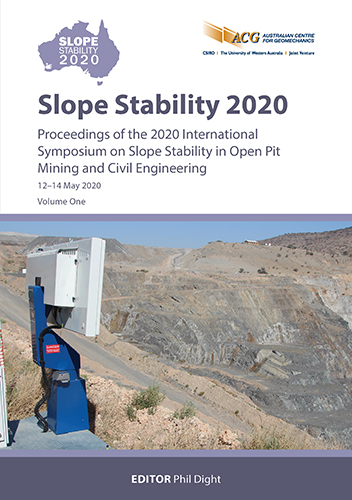Bayesian approach for the assessment of sufficiency of geotechnical data

|
Authors: Contreras, LF; Serati, M; Williams, DJ |
DOI https://doi.org/10.36487/ACG_repo/2025_37
Cite As:
Contreras, LF, Serati, M & Williams, DJ 2020, 'Bayesian approach for the assessment of sufficiency of geotechnical data', in PM Dight (ed.), Slope Stability 2020: Proceedings of the 2020 International Symposium on Slope Stability in Open Pit Mining and Civil Engineering, Australian Centre for Geomechanics, Perth, pp. 609-624, https://doi.org/10.36487/ACG_repo/2025_37
Abstract:
The characterisation of geotechnical materials for the design of mine and civil slopes requires the collection of data through site and laboratory investigations. The information provided by data contributes to the reduction of the knowledge uncertainty of design parameters. However, the amount of data collected at different stages of project development is normally limited and subjected to budget and time constraints. Proper assessment of data sufficiency at each stage is, therefore, a key aspect of the slope design process. The paper discusses the common technique used to relate the number of data points with safe values of the design parameters based on the concept of confidence interval (CI) from classical statistics (i.e. the frequentist approach). This conventional approach is then contrasted with a technique based on the highest density interval (HDI) from Bayesian statistics, which offers a simpler and more intuitive way to judge the sufficiency of data. The discussion is illustrated with examples of analysis of uniaxial compressive strength (UCS) data, and the intact rock strength parameters σci and mi of the Hoek–Brown strength criterion.
Keywords: uncertainty, Bayesian statistics, data quantity, parameter confidence
References:
Baecher, GB, 2017, ‘Bayesian thinking in geotechnics’, Proceedings of Georisk 2017, American Society of Civil Engineers, Reston.
Baecher, GB & Christian, JT 2003, Reliability and Statistics in Geotechnical Engineering, Wiley, Chichester.
Bayes, T 1763, ‘An essay towards solving a problem in the doctrine of chance’, Philosophical Transactions, vol. 53, pp. 370–418.
Contreras, LF & Brown, ET 2019, ‘Slope reliability and back analysis of failure with geotechnical parameters estimated using Bayesian inference’, Journal of Rock Mechanics and Geotechnical Engineering, vol. 11, no. 3, pp. 628–643.
Contreras, LF, Brown, ET & Ruest, M 2018, ‘Bayesian data analysis to quantify the uncertainty of intact rock strength’, Journal of Rock Mechanics and Geotechnical Engineering, vol. 10, no. 1, pp. 11–31.
Gill, DE, Corthesy, R & Leite, MH 2005, ‘Determining the minimal number of specimens for laboratory testing of rock properties’, Engineering Geology, vol. 78, pp. 29–51.
Harr, ME 1987, Reliability-based Design in Civil Engineering, Dover Publications Inc., Mineola.
Jaynes, ET 1957, ‘Information theory and statistical mechanics’, The Physical Review, vol. 106, no. 4, pp. 620–630.
Kruschke, JK 2015, Doing Bayesian Data Analysis: A Tutorial with R, JAGS and STAN, Academic Press, Cambridge.
Read, J 2009, ‘Data uncertainty’, in J Read & P Stacey (eds), Guidelines for Open Pit Slope Design, CSIRO Publishing, Collingwood, pp. 211–218.
VanderPlas, J 2014, Frequentism and Bayesianism: A Practical Introduction, blog post, viewed 20 January 2015,
Zhang, J 2017, Bayesian Method: A Natural Tool for Processing Geotechnical Information, joint TC205/TC304 Working Group on “Discussion of statistical/reliability methods for Eurocodes”, Final Report, International Society for Soil Mechanics and Geotechnical Engineering, London.
© Copyright 2026, Australian Centre for Geomechanics (ACG), The University of Western Australia. All rights reserved.
View copyright/legal information
Please direct any queries or error reports to repository-acg@uwa.edu.au
View copyright/legal information
Please direct any queries or error reports to repository-acg@uwa.edu.au
